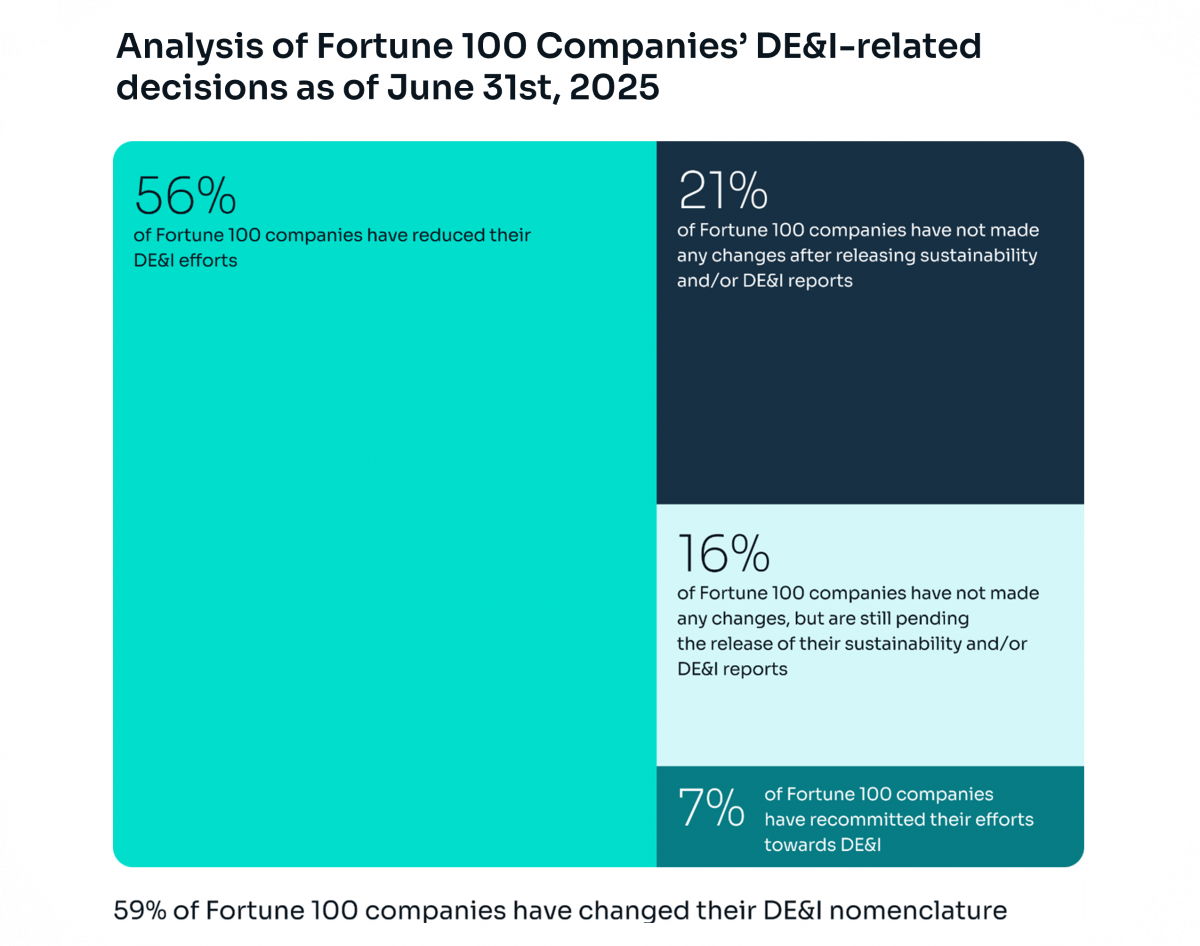AI-Powered Asset Management: From Experimentation…

Tracking how leading corporations are adapting to evolving Diversity, Equity and Inclusion (DE&I) policies and political pressures. Sia is sharing these insights on a quarterly basis.

In 2025, we have been analyzing publicly available information on a quarterly basis, identifying trends among the Fortune 100 with respect to DE&I-related nomenclature, reporting and program structures. We’ve identified four categories that highlight distinct trends for how these corporations are engaging with DE&I initiatives:
As the conversation around DE&I continues to evolve, we are pleased to share our second quarterly update with emerging trends and other relevant DE&I developments. In Q2, we have identified three key takeaways:
Recent analysis shows that half of the Fortune 100 companies have scaled back their DE&I programs or reporting practices. For example, roughly one quarter of the corporate donors to New York City’s annual Pride festivities have either canceled or scaled back their support in 2025, citing economic uncertainty and fear that the Federal Administration could punish corporations it viewed as supporting a celebration of gay and transgender rights.
While some companies continue to reinforce their commitment to DE&I, there has been a notable shift away from these initiatives across much of the Fortune 100.

The Supreme Court's decision in Students for Fair Admissions has emboldened critics of DE&I programs in the past few months, leading to increased litigation and legislative efforts to limit or eliminate them:
The EEO-1 form, filed by companies annually to the US Equal Employment Opportunity Commission since 1966, mandates that companies break down their workforce by seven racial and ethnic groups and by gender, and then divide them across 10 job categories, from executives and managers through to service workers and laborers. EEO-1 has been historically used by the government to create a picture of the national workforce, look for disparities in hiring, and track broad trends across industries.
In 2025, conservatives recommended ending the practice of tracking these trends and changes following Executive Orders banning federal DE&I efforts. One such change is that gender information will only refer to male and female, with companies no longer able to report any non-binary or transgender staff. The reason for these changes is based on the claim that the Civil Rights Act makes it clear that company actions can’t be motivated in whole or in part by, an employee’s race, sex or other protected characteristics. That’s the same standard conservative legal groups have used to file lawsuits on behalf of White men who allege they have been fired or denied a promotion because of DE&I programs designed to address broad racial or gender disparities.
The plaintiff, a 54-year-old White man, alleged that Target’s DE&I policies have led to the discriminatory treatment of White and older employees like himself - after the company hired a Black man under 40 as the store's new director, his performance reviews were negatively impacted, and he was ultimately fired because of his race and age. The case was subsequently dismissed, and details about the settlement were not made public.
The City of Riviera Beach Police Pension Fund has filed a lawsuit on behalf of Target shareholders. The lawsuit alleges that Target misled investors by failing to disclose the risks linked to its DE&I initiatives, and the backlash from its Pride campaigns.
The State of Missouri alleged that Starbucks engages in race and sex discrimination through its DE&I programs, which skews the hiring pool towards people who are less qualified to perform their work, increasing costs for Missouri's consumers. In April 2025, Starbucks filed a motion to dismiss, arguing that the State of Missouri lacked a concrete interest in Starbucks' hiring practices and DE&I programs, unlike an employee who might be directly affected.
The American Alliance for Equal Rights (AAER) is currently challenging American Airlines' supplier diversity program, claiming that it unfairly excludes White business owners from participating and securing supplier contracts with the airline.
A federal district court for the District of Maryland has issued a nationwide injunction temporarily halting a few provisions of the Administration’s executive orders against DE&I. The court held that the two Executive Orders likely violated the First and Fifth Amendments of the United States Constitution impacting the plaintiff’s freedom of speech and due process rights. The court held the executive orders were unconstitutional because they are vague, abridge freedom of speech in the form of viewpoint discrimination, and condition the award of federal funding on those with viewpoints consistent with the administration’s ideology.
So far, the following provisions under the Executive Orders are on pause:
DE&I has prevailed in shareholder battles across corporate America in many organizations from Coca-Cola to Berkshire Hathaway. But while anti-DE&I proposals have become more common, they have not had success in recent shareholder votes. Across the board, support for these proposals has ranged from only 1% to 2% of voters.
Young consumers have been abandoning brands that have been pulling back on their DE&I initiatives: 40% of Gen Zers, and 19% of all consumers, have stopped using or purchasing brands who contradicted or reversed DE&I efforts, according to a March survey by Ad Age and The Harris Poll. Over half (53%) of Gen Z, and 36% of the general population, have, are, or will participate in an economic boycott.
Despite the trends in eliminating or recasting corporate DE&I initiatives in recent months, pushback in favor of DE&I initiatives is still apparent through shareholder votes, court decisions and consumer sentiment. In some cases, the market has moved against the current. We will continue to track these trends over the coming quarters.
Managing Director, ESG Strategy & Communications Lead | New York
Judy Sandford is a Managing Director at SiaXperience, part of Sia Partners, leading the ESG Strategy & Communications practice.
